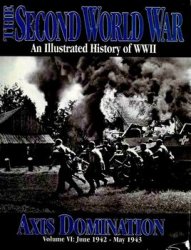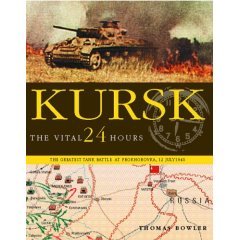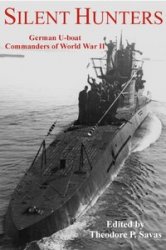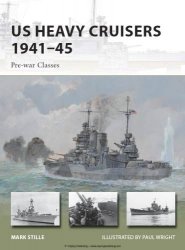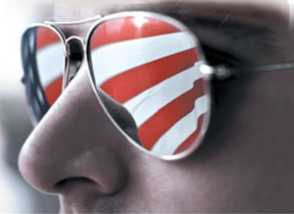
On the night of March 22,1901,as rain battered his campsite in the deep jungles of Luzon Island in the Philippines, Frederick Funston pondered what awaited him the next day. Ten miles to the north lay his prey, Emilio Aguinaldo, President of the Philippine Republic. For two years, the American army had been trying to capture Aguinaldo. But repeatedly Aguinaldo had slipped away. This time Funston was close. His ruse was working.
It had been a wild idea, something out of a boy's adventure story. He conceived it after capturing a Filipino messenger carrying coded documents. Funston's interrogation of the courier had been successful. (It was later said that Funston had subjected him to the "water cure,"an effective new aid to military intelligence whereby several gallons of water were forced down a suspect's throat; his painfully distended belly was then beaten with logs.) The courier confirmed that Aguinaldo's secret headquarters was located in a remote area of Luzon.
Funston had chosen eighty Filipino scouts from the Macabebes, a tribe hostile to Aguinaldo. He outfitted them in the uniforms of Aguinaldo's army and trained them to pretend to be Filipino nationalists. These "nationalists" would escort five American "prisoners"(including Funston) for presentation to Aguinaldo. When Funston outlined his scheme to his superior, General Arthur MacArthur had deep misgivings. "Funston, this is a desperate undertaking,"he said as they parted. "I fear I shall never see you again."
The words pleased Funston, who longed to be a hero. Ever since he was a child, he worried that he failed to measure up to his father. Edward "Foghorn"Funston had been an
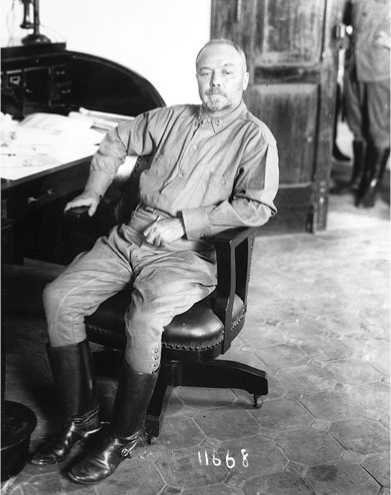
Frederick Funston: hero or antihero?
Artillery officer during the Civil War and a fiery Republican congressman afterward. At six feet two and 200 pounds, he was regarded by all as an exemplar of nineteenth-century manhood. But Frederick, born in 1864, was only five feet four and slightly built. His schoolmates had teased him. He compensated with bravado displays of martial manliness. He craved a military career, but though his father was a con-gressman, West Point rejected him: His grades were mediocre, and he was too small.
In 1886 he enrolled at the University of Kansas but didn't fit in. He devoted himself to the pursuit of the most desirable women on campus, all of whom spurned him. Increasingly he retreated from social situations, preferring to drink alone in his room, periodically bursting out in a drunken rage, screaming obscenities at the top of his lungs.
He dropped out of college and avoided contact with other people. First, he explored an unmapped section of Death Valley in California. Then he volunteered to gather botanical samples in Alaska for the Department of Agriculture. When the department proposed that he command an entire expedition for the purpose, he flatly turned them down. "I do not need anybody to take care of me, and I do not want to take care of anybody." Alone, he trekked into the frigid wastes of northern Alaska and remained there for the better part of a year. When he ran out of food he ate his sled dogs.
During those long, silent nights, Funston realized that he could hardly prove that he measured up if no one were around to take the measurements. He decided to become a soldier, not caring much against whom he fought. In 1895 he contacted a recruiter for the cause of Cuban independence and accepted a commission as an artillery officer in the rebel army.
In Cuba he was given command of a Hotchkiss cannon; he made up for his lack of gunnery skill by sneaking his cannon absurdly close to Spanish fortifications at night, often within 400 yards. As the sun rose, the Spaniards, aghast at what was sitting on their doorstep, fired everything they had at Funston's cannon. Funston calmly adjusted the sights, pulled the lanyard, and climbed upon the parapet, shouting "Viva Cuba libre!" He was repeatedly wounded;once, a bullet pierced his lungs. When a severe hip wound became infected, he returned to the United States for medical assistance.
But he was not done with war. In 1898 Funston was given command of the Kansas regiments that had volunteered against Spain. To his dismay, they were sent to the Philippines, where the Spaniards had already ceased fighting. But after President McKinley decided to annex the Philippines, war broke out between the Americans and the Filipino nationalists. Funston finally got what he craved: sweeping charges, glorious victories, and newspaper feature stories. Yet the jokes persisted. Behind his back, his men called him the "Bantam General." The New York Times, in its coverage of a battle in which he won a Congressional Medal of Honor, ran the headline: "Daring Little Colonel Funston."The opening
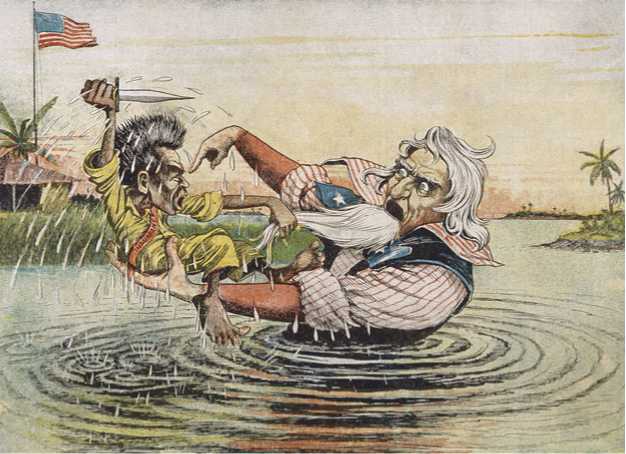
Cartoon of Uncle Sam drowning in pursuit of Aguinaldo.
Paragraph attributed Funston's courage to the fact that he was too small to hit.
But now, if he captured Aguinaldo,
Funston, the little man, would become a great one.
On March 23,1901, Funston's Macabebes and their five American "prison-ers"met up with a contingent of Aguinaldo's army. Deceived, Aguinaldo's troops escorted Funston's band into the town of Palanan.
Aguinaldo watched from a window above.
When shots rang out, thinking the troops were firing a salute, he shouted,"Stop that foolishness. Don't waste ammunition!"
Then Funston burst into Aguinaldo's compound: "I am General Funston. You are a prisoner of war of the Army of the United States of America"
Dazed, Aguinaldo replied, "Is this not some joke?"Funston seized Aguinaldo, dragged him through the jungle to the coast, where the USS Vicksburg was waiting. It took them to American headquarters in Manila.
After being subjected to intense pressure by American officials, Aguinaldo renounced the Filipino revolution, swore
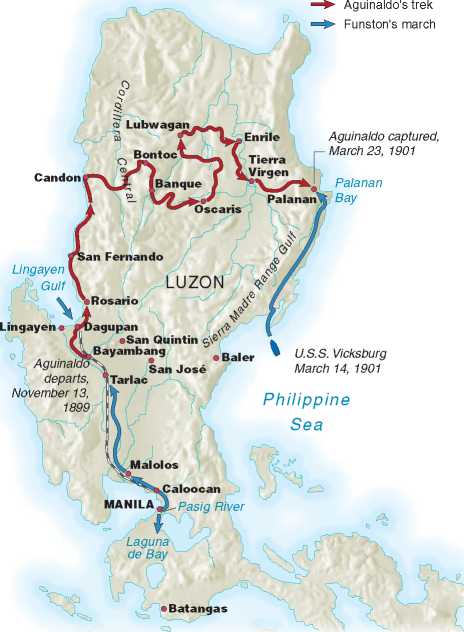
The Defeat of the Filipinos and Capture of Aguinaldo, 1899-1901
Aguinaldo's flight, and Funston's pursuit and capture.
Allegiance to the United States, and called on his followers to do likewise. The Philippine-American conflict was virtually over. Frederick Funston had almost single-handedly won the war.
For a time, Funston was a sensation. He was promoted to brigadier general. Newspaper editors and politicians championed him for governor of Kansas or for vice president on a ticket headed by Theodore Roosevelt in 1904. But within a few years Funston all but vanished. Anti-imperialists pointed out that Funston's men had surrendered and then fired their weapons, and that the Macabebes had been wearing enemy uniforms; both actions violated international law. Worse, several reporters and some of his soldiers claimed that Funston had ordered the execution of Filipino prisoners. He was ordered to an inconsequential command in San Francisco.
One hundred years after Funston's capture of Aguinaldo, U. S.troops would again be tracking a rebel fugitive: Osama bin Laden, mastermind of the September 11,2001,attacks on the World Trade Center and Pentagon. That virtually no one recalled Funston's single-handed pursuit and capture of Aguinaldo was one measure of how completely he had slipped from view.
But Funston's name resurfaced in 2010,after major earthquakes had triggered widespread looting in Haiti and Chile. The New York Times observed that when the 1906 earthquake destroyed much of San Francisco, General Frederick Funston had immediately marched his troops into the city and taken charge; sometimes, the Times noted, leaders must act decisively.




 World History
World History